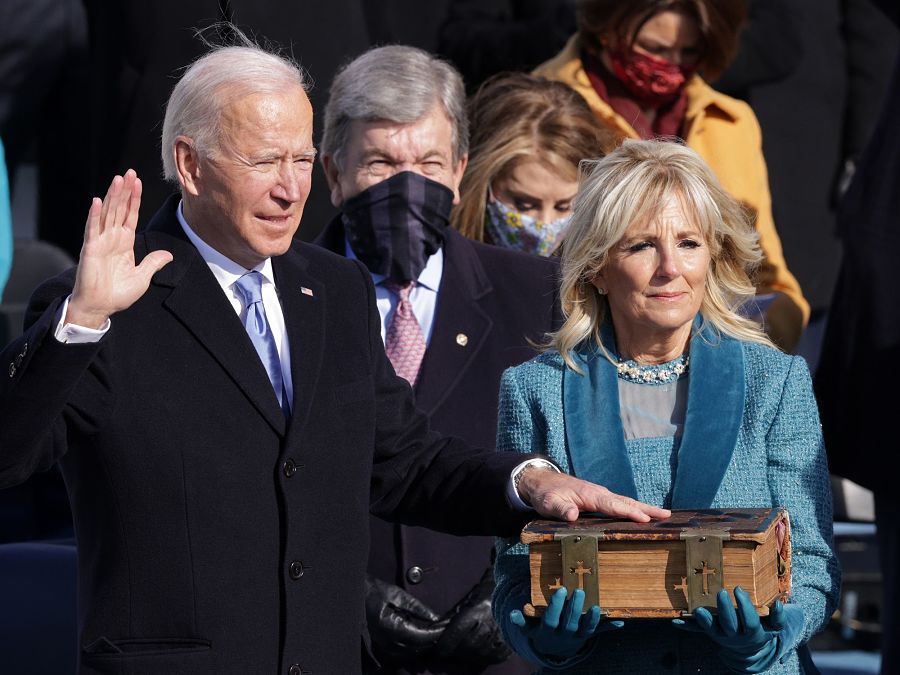The Biden administration will review a regulation approved last fall by the Trump Department of Labor that could curb the use of environmental, social and governance factors in retirement savings accounts.
Hours before President Joseph Biden was inaugurated today at the U.S. Capitol, the Biden transition team released a list of more than 100 Trump regulations approved since 2017 that it intends to revisit.
That action is part of several executives orders and other moves Biden is taking to “reverse the gravest damages of the Trump administration … but also to start moving our country forward,” a Biden transition fact sheet states.
The DOL rule, which amends the investment duties regulation of federal retirement law, requires plan fiduciaries to select investments and strategies based solely on how they will affect the plan’s financial performance, or so-called pecuniary goals.
Critics of the highly unpopular rule contend it could chill ESG investing related to retirement savings. The measure was published in the Federal Register on Nov. 13 and went into effect on Jan. 12.
“Today, the White House Chief of Staff will also issue a regulatory freeze memo that will pause any new regulations from moving forward and give the incoming Administration an opportunity to review any regulations that the Trump Administration tried to finalize in its last days,” the Biden transition fact sheet states. “This action will allow the Biden Administration to prevent any detrimental so-called ‘midnight regulations’ from taking effect, while ensuring that urgent measures in the public’s interest can proceed.”
With the so-called DOL ESG rule in effect, the Biden DOL would have to undertake a new rulemaking to overturn it through the regulatory process.
A separate DOL regulation that would reform investment advice requirements for retirement plan fiduciaries will not go into effect until Feb. 16. The Biden DOL could delay the effective date of this regulation, which has been criticized by investor advocates, while it decides on its next steps.
Both the ESG and fiduciary rules were finalized late enough in the Trump administration that they’re vulnerable to being overturned by Congress through the Congressional Review Act. A vote of disapproval through the CRA process only requires a simple majority, meaning it wouldn’t be stymied by a filibuster in the Democratic-controlled Senate.
Democrats control the 50-50 Senate thanks the tie-breaking vote of Vice President Kamala Harris. They also hold a narrow majority in the House. If a CRA makes it through Congress, it would be signed by Biden.
There are plenty of late-breaking Trump administration regulations that Democratic lawmakers oppose. In addition to the DOL, the Securities and Exchange Commission approved final rules late last year to open private markets to more ordinary investors and regulate the use of derivatives.
Sen. Sherrod Brown, D-Ohio and incoming chairman of the Senate Banking Committee, told reporters last week that he will target some late-breaking rules by the SEC and other agencies under the panel’s jurisdiction.
“We’re making a list,” Brown said. “There will be a handful. They will come to a vote on the Senate floor and the House floor I assume sometime before April.”
Brown’s vow to go after Trump administration regulations echoes a similar call in December by House Financial Services Committee Chairwoman Maxine Waters, D-Calif.
But Democrats might not want to unleash the CRA if they want the Biden administration to do its own rulemaking in key areas like ESG and investment advice policy. After scuttling a regulation, the CRA does not allow an agency to promulgate a substantially similar regulation.
“CRA is a blunt instrument,” said Brian Gardner, chief Washington policy strategist at Stifel Financial. Congressional Democrats “have to be careful that it doesn’t boomerang on them and limit the Biden administration’s options.”
[Video: Make DEI a mandate, not a check box in financial services industry]








